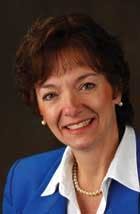The reminder is in the mail
by Ann-Marie C. DePalma
Have you ever received a follow-up reminder from an instructor you took a seminar from a year ago? Michele Darby, RDH, MS, provides course participants with this reminder in her program, "Taking Your Career to the Next Level: Advanced Degrees in Dental Hygiene."
During the program, participants set tangible one- and five-year educational and career-related goals. The written goals are then mailed to participants one year later. Imagine what it's like to receive such a mailing after you have been working toward (or forgotten) that goal! For those who have taken no action toward their goal, it is a gentle reminder to begin. This strategy allows participants to reflect on their career aspirations long after the seminar experience.
Michele is a graduate of the dental hygiene certificate program at the University of Pittsburgh and received her bachelor's and master's degrees from Columbia University.
While she was a student at the University of Pittsburgh, Michele was mentored by Anne McFadden, RDH, PhD, who encouraged her to pursue the degree completion program at Columbia. While at Columbia, another mentor, Kathy Silko Miller, RDH, MS, inspired her to complete her master's degree and pursue a career in academics. These and other mentors have pointed Michele towards formal education, and she wants to share this inspiration with others. She feels that advanced formal education is a top priority for the hygiene profession. She learned early that without strong academic credentials, it is difficult to expand one's career opportunities.
Currently, as graduate program director at the Gene W. Hirschfeld School of Dental Hygiene at Old Dominion University, Michele interacts daily with the next generation of dental hygienists.
Working with other graduate program directors such as Dr. Cynthia Amyot and Rebecca Wilder led Michele to offer the "Next Level" program. Offering continuing education is a natural extension of her roles and interests.
Dental hygienists who love dental hygiene, want to build on their clinical expertise, and want to follow new career paths should consider taking the "Next Level" program. This course allows hygienists to think about their futures, analyze their situations, and take control of their careers. It is not a "how-to do this procedure" type of course, but a conscious-raising experience. A hygienist who invests time and money in this program may be motivated to continue a degree, learn about dental hygiene program options, or explore various career opportunities. Through the program, Michele sees herself as a personal trainer who motivates colleagues and helps hygienists realize what they can achieve and what they can contribute to the profession and society.
A hallmark of any profession is that members possess advanced degrees. Michele is concerned that dental hygienists are not pursuing more formal levels of education. She likens the profession to other health-care professions that were similar to dental hygiene at one time, such as nursing, occupational therapy, and physical therapy. Most of these professions began at the apprenticeship/certificate/associate degree level. Now they all offer doctorates as their terminal degree. Professional nursing, as defined by the American Nurses' Association, requires at least a bachelor's degree. Occupational therapists must have at least a bachelor's degree, and physical therapy is transitioning to a doctorate for entry-level practitioners!
In contrast, dental hygiene is moving in the opposite direction with expansion of the associate's degree as entry level and the closing of many bachelor's and master's programs. It's difficult to convince legislators and other mid-level health care professionals that dental hygiene is capable of greater autonomy and self-regulation when the majority of hygienists hold only an associate's degree! Regardless of their degree, dental hygienists should encourage new graduates and colleagues to pursue at least a bachelor's degree. The "Next Level" program expands on that philosophy and how together we can establish the "profession" of dental hygiene. Once dental hygiene achieves full professional status, our service to society can be greater.
As an evolving profession, we have a mission to work with international faculty, students, and practitioners to improve the quality of dental hygiene education and practice standards globally. Given the link between systemic and oral health, we know that educated hygienists can improve access to health care and cut morbidity and mortality rates of people in underserved and undeveloped areas. As such, dental hygienists can contribute to the economic development and stability of countries by helping the workforce stay healthy.
The challenges we face need constant vigilance from a well organized, fully subscribed professional organization, and Michele is a member of ADHA. As a continuing education speaker, she loves the idea of delivering a message that makes people think. The responsibility of presenting a subject forces her to think about the topic on a different level. She admits that she never really learns a subject until she has to teach it! The PowerPoint presentation she uses contains testimonials of dental hygienists as faculty, administrators, managers, researchers, and entrepreneurs.
Michele also presents continuing education programs on oral risk assessment, becoming a discriminating consumer of professional literature, and application of the human-needs model in dental hygiene practice. However, the "Next Level" program is designed to help hygienists identify their "ideal" employment position, leadership position, community service accomplishment, or just gain a new skill. That's what a profession is all about — enhancing not only the profession's body of knowledge, but enhancing the members' strengths and providing valuable career opportunities.
For more information about Michele's programs or educational opportunities beyond the associate's degree level, contact Michele at: http://www.odu.edu/mdarby or www.odu.edu/dental.
Ann-Marie C. DePalma, RDH, BS is a practicing hygienist in a periodontal-implant practice.She is a graduate of the Forsyth School for Dental Hygienists, is active in the Massachusetts Dental Hygienists' Association, and is a Fellow of the Association of Dental Implant Auxilliaries and Practice Management.Ann-Marie has written articles and presents programs on dental implants, TMD, and developmental delays and can be reached at [email protected].

